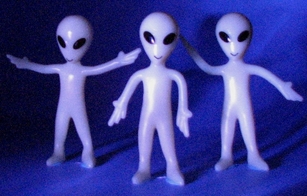
The idea of living intelligence coming for a visit from some faraway place in the universe is very old and well entrenched in our minds. As the science of radio waves became a reality in the late 1800's, the search began with a serious attempt to listen for other life in outer space. Inventors like Marconi and Tesla believed that radio was the way in which other inhabitants would contact us. There was a period in 1924 when everyone with a radio was asked to turn it off for 5 minutes each hour so that receivers here could hear the signals from space. And, from that point, there is a divergence from serious inquiry to the images that we recognize as real.
Science fiction coupled with the "possibility" of extraterrestrial life, fueled the imagination of many writers and the general public. In 1938 when Orson Wells broadcasted the fictitious "War of the Worlds" radio drama, based on the H.G. Wells novel, depicting creatures from Mars invading New Jersey, the gloves were off. People began seeing things in the sky, visitors walking among us, and gradually the drawings appeared of the above featured characterizations with the large head and sinister yet playful eyes.
Well, is there life out there? Part of the answer revolves, (pun intended), in the Copernium Possibility which states that the earth is not such a special place and that other hospitable locations could be home to other life. But as to visits here on earth, there is no credible evidence to support the claims. Although Roswell and Area 51 are real, the creatures are not. This falls into the category of Bigfoot and the Loch Ness Monster. A more realistic photo above might be of a one-celled critter. However, I would never say never.
Meanwhile, SETI, Search for Extraterrestrial Life, continues to listen for radio communication from "out there" despite the electrical sounds of the universe and the cacophony of sounds that we generate ourselves in so many frequencies.
As a complete aside, my favorite fictional visit is still "The Day the Earth Stood Still" from the 1950's. Although the subtext is a commentary about nuclear war I really appreciated Gort. "Klaatu barada nikto"
 RSS Feed
RSS Feed
